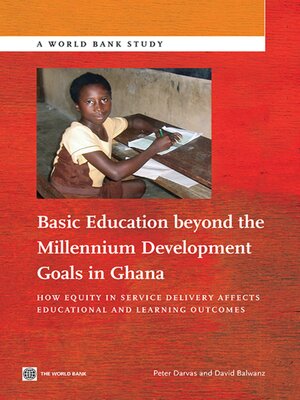Basic Education beyond the Millennium Development Goals in Ghana
ebook ∣ How Equity in Service Delivery Affects Educational and Learning Outcomes · World Bank Studies
By Peter Darvas

Sign up to save your library
With an OverDrive account, you can save your favorite libraries for at-a-glance information about availability. Find out more about OverDrive accounts.
Find this title in Libby, the library reading app by OverDrive.



Search for a digital library with this title
Title found at these libraries:
| Library Name | Distance |
|---|---|
| Loading... |
Ghana is on a strong trajectory toward solidifying its middle income status. Today, more childrenthan at any time in the history of Ghana have access to basic and secondary education. Overthe past decade, incidence of extreme poverty has been cut in half amid strong economic growth.Ghana's recent achievements point to the possibility of more fully realizing the human potential ofall individuals and of the country.Basic Education beyond the Millennium Development Goals in Ghana argues that realizing thispotential requires a redoubling of efforts to reach the poorest half of Ghanaian children with qualitybasic education. At present, system-wide disparities in education service delivery and highlyinequitable allocation of resources has led to unfair educational outcomes. These disparities createa "missing middle" in terms of learning outcomes: although a small number of children performwell on numeracy and literacy assessments, more than 60% of 6th graders do not attain profi ciencylevels.Several recent initiatives point to the possibility of accelerating Ghana's progress toward qualitybasic education for all: they improve equitable resource allocation, strengthen social protection, andprovide additional academic support to improve learning outcomes. By outlining key challenges andpromising practices, Basic Education beyond the Millennium Development Goals in Ghana seeks tostimulate a lively and productive debate on the future of basic education in Ghana.







